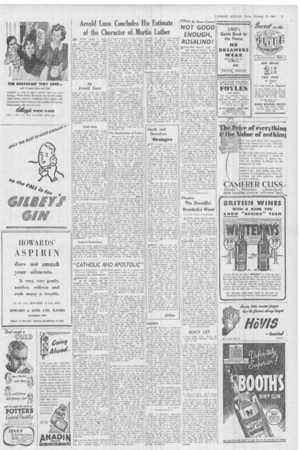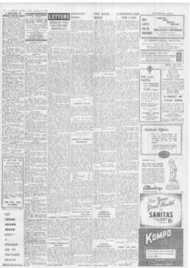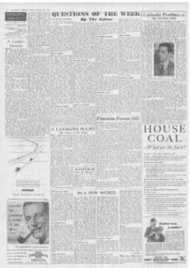Page 3, 22nd February 1946
Page 3

Report an error
Noticed an error on this page?If you've noticed an error in this article please click here to report it.
Tags
Share
Related articles
I On February 18, 1546, Luther Died I
A Quotation From His Books Enough To Destroy The Luther...
Spain And Foreign Intervention
Luther And Card. Gasquet
'coulton-lunn Debate Examined By An Anglican Critic
Arnold Lunn Concludes His Estimate of the Character of. Martin Luther
by Arnold Lunn
MR. RUPP would, I think. have found it more difficult to rebut Denifle's than
Wiener's attack on Luther's morals. It would be interesting to know Mr. Rupp's interpretation of Melanchthon's letter on the demoralising effect on Luther of the apostate nuns among whom ho. lived (3). Luther himself asserts that the temptations of the body are as irresistible as the external pres
sure of an all-powerful tyrant. Who does not know," he writes, " that this domestic tyrant within, who is in our limbs, is not more under our control than the evil will of a. tyrant exterior to us? Moreover, you can soften the latter by flattering words and mould him to your point of view; but the
tyrant who lives within you, ecither beautiful words, nor the most painful efforts can tame (4). It is the man who has conquered sex who proclaims the possibility of purity, and the man who has failed who preaches the impossibility of continence. Does Mr, Rupp seriously believe that the Luther who insisted again and again that chastity was the rarest of miracles could live under the same roof as nuns whom he had urged to break, their vows. and resist temptations aguinst purity which he himself had declared to be virtually irresistible?
Faith Only Denifle is surely right when he seee in Luther's frank confession, " I have not in me that which is necessary to live in continence " (5) the key to his revolt against the Church. The fox that has lost his tail of chastity is always anxious to prove that all other foxes are tailless. Such must be the explanation of Luther's foul libel on mankind. " God has not enough confidence in us," he writes, " to believe that there is a single married man who is content with his wife or vice versa. He spares nobody:, in this commandment he accuses all of us, men and women alike, of being adulterers. . To all of us, without exception, be says that we are libertines; if we are not openly in the eyes cif the world. we are none the less so in our hearts, and every time that we had the facility, the time. the place or the opportunity, we should all be adulterers " (5). Womee, he insisted, are made to serve either as wives or prostitutes (7).
Concupiscence is invincible. The only lertue open to us is faith. The only sin is inliddity. " You have no other duty to God but to believe in Him. For the rest He leaves you free to choose and to do what you wish without any danger to your conscience, even if you decide to desert your wife" (8).
" Sin cannot detach you from Him," writes Luther, " even if you were to commit a thousand lecheries and as many homicides in a day " (9). And in his notorious letter to Melanchthon of August 1, 1521, he writes. ..Be a einner, and sin boldly and the more boldly repent." No wonder the Deformation was popular. What could he more reassuring than the good news that " When the heart understands that Christ accomplishes the law in our place, and takes our sins on himself, the heart is no longer worried by the thought that Christ commands the impossible, which we must despair of accomplishing " (10).
Logical Deductions Luther drew logical deductions from his creed when he gave Philip of Flesse written authority to commit bigamy and to defend that bigamy with a lie. "-What harm can it do," he wrote, " if a man tell a lie in a worthy cause . . . to lie in a case of necessity, or for convenience, or in excuse . . such lying would not he against God " (I I). This was a shade too much even for Phillip. " I will not lie," he replied. " for lying has an evil Sound and no apostle or Christian has ever taught it " (12). On September 3, 1521. Luther .advised Henry VIII to solve his own matrimonial troubles by bigamy (13). Starting as always from the premise that continence was impossible. and that any impediment to marital relations justified adultery. he advises the husband of a wife who denies him her favours, to seduce the servant. " You won't,
well, perhaps. another will. . .
Madame won't. . Let the servant approach " (14). Elsewhere he advises the wife of a man who cannot give her a child to cohabit with her brother-inlaw in secret. and then pass off the child as her husband's (15).
Even Lutherans were dismayed by thc inevitable consequences of this inrinoral teaching. Pirkheimer, one of the earliest converts to Lutheranism, exclaimed. " The scoundrels of the new Gospel make those of Popery seem pioue" (16). The great heresiarch himself in his rare moments of insight perceived the true character of the Reformation. " To-day our followers are seven times more scandalous than those others have been up to now. We steal, we lie, we deceive. we cat and drink to excess, and we abandon ourselves to all the vices " (17). He deplored the fact that he had been born in Germany, and expressed the hope that tic would die before witnessing the divine chastisement which was to fall on Germany (18).
The Explanation of Luther ," How comes it," the reader may well ask, " that if Luther was what you represent him to be. tprit he attained the position which he did?" First, because Luther represented a national rather than a religious revolt. the revolt of the Germans against Latin domination, with the result that the most potent of all allies. nationalism, has been enlisted ni his favour. In England, as in Germany, the revolt against -Rome was national rather than tellgious, and Luther "was accordingly elected en honorary Englishman. Secondly. every possible allowance is made for any man who achieves prominence as an enemy of Rome. Not the love of Christ, but the hatred of Christ's Vicar, is the trueexplanation not only of Luther's reputation as a great religious reformer, buL also of Lea's reputation as a great historian. Fr. Thurston, as we know, emerged triumphantly from Dr. Coulton's challenge to him to justify his statement that Lea aver aged a mistake a page. Dr. Coulton, in our correspondence, has admitted to ". mistaken ciedulity," so far as Lea is concerned. " Mistaken credulity " explains the boosting of Lea as a great scholar and the boosting of Luther as a Protestant Saint, and it is greatly to the credit of Dr. Coulion that when faced, in our correspondence. with the facts which I have cited in these articles, he should have replied (italics mine), " Denifle was perhaps the greatest medievalist of our time. . . . He has dug out from Luther's TableTalk and letters passages which are not only repellant but grossly repulsive, 'end it is discreditable to Lutheran historians that these things should have remained so long unknown or unconteased. As a fault of omission it seems to me as serious as those which I have often charged against, the Roman Church. But it lacks, so far as 1 know. the •further and far greater fault of refusing to recogaise mis-statemeat of fact, errors of commission. However, the neglect by Luther's special biographers of facts which, as now revealed, appear so patent and significant, seems inexcusable; and Writing now without verification, on the authority of Denifle and of the quotation you give I feel heartily ashamed." I invite' Mr. Rupp to follow Dr. Coulton's lead. I wish to emphasise the fact that it is Luther, not Lutheranism which I am attackingThe Lutheran preachers who were apostates, and in many cases exmonks who gave great scandal by their lives were succeeded by men born in Lutheranism. The later Lutheran pastors contrived to ignore the evil in Luther and to concentrate on what was Catholic in his writings with the result that the characteristic Lutheran piety often assumed edifying forms.
REFERENCES.-(3) D. ii,eI20. (4) D, 173, W, viii. 631. (5) D, 1, 177, from a sermon which was printed without Luther's permission. It created a scandal and Luther subsequently republished it with omissions. (6) D, 1, 169. (7) D. i, 200, W, xii, 94. 20. ite) D, ii, 136, gives reference
Car. 7, 24. quoting from
Luther's commentary. (9) W, vi, 529, 1, 32. Enders. iii, 208. 00) D. iii, 379, E, ii;e60. (I11) Lenz Briefwechsel i, 73. 375. (12) Quoted by Wiener, p. 41. (1)) E.B.. ix, 93, 88. (14) E, 20. 72. (15) E.B.. v. 289, being a letter from Duke Georges of Saxony quoting phrases of Luther from hisBabylonian Captivity and fir; Sermon on marriage. W, vi, 558.
(16) Quoted by i, 36, from Heumann. (17) D, 1, 37, E, 36. 411. (18) E, 8.'295. (Martin Luther. Hitler's Cause or Cure? By Gordon Rupp. Lutterworth Press, 6se
blog comments powered by Disqus







